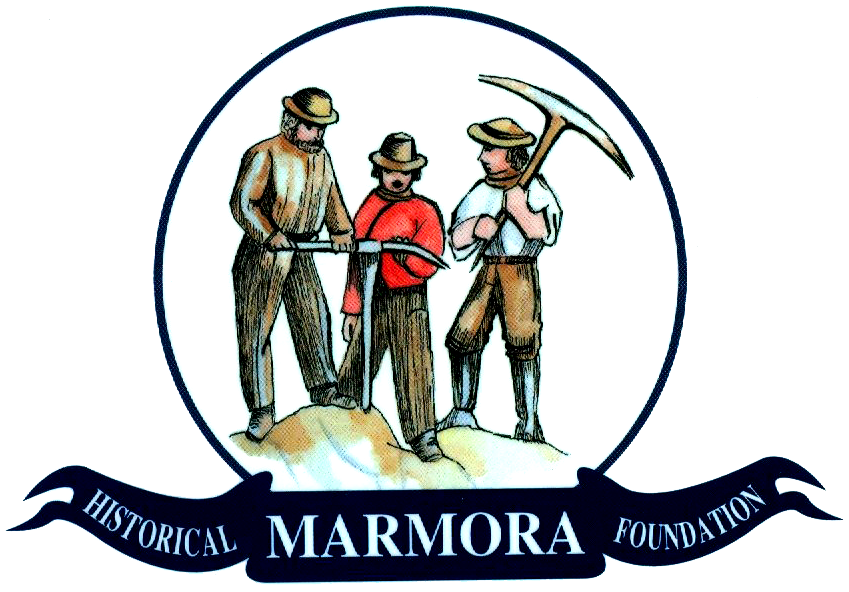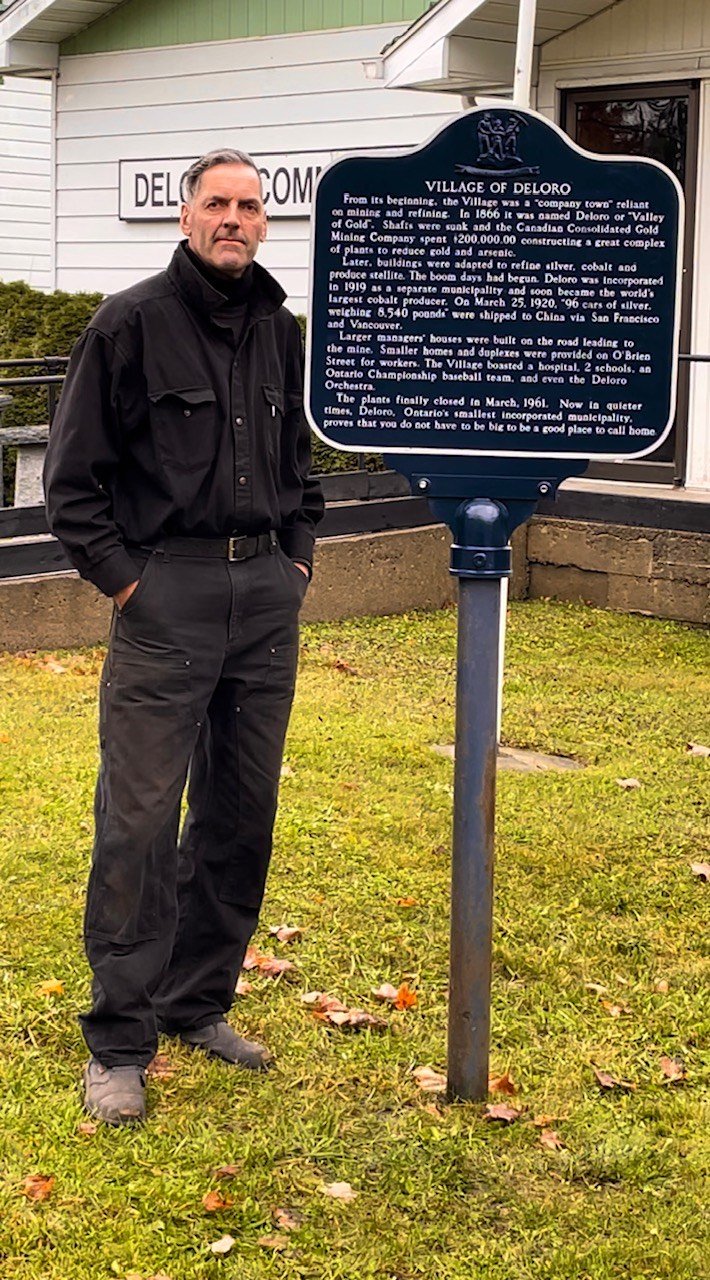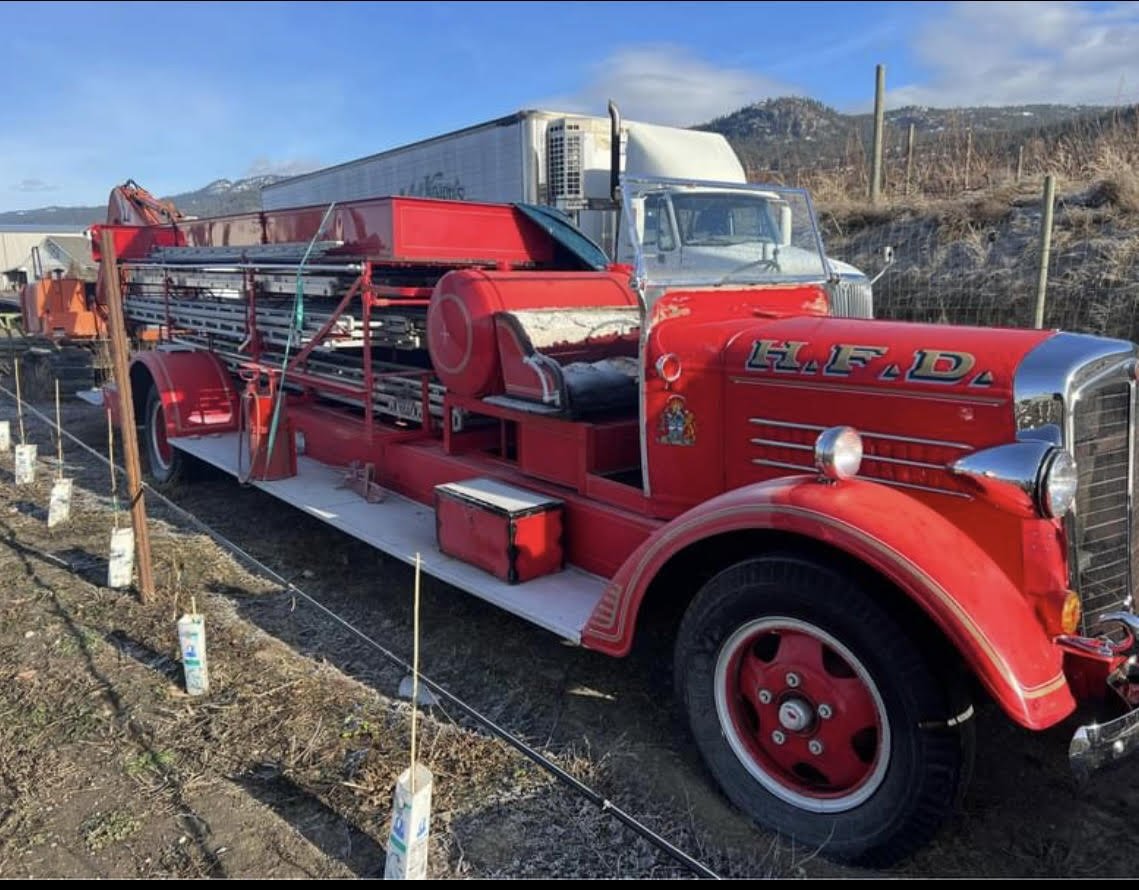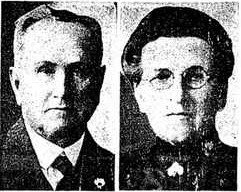Interview with Jack Grant June 19, 1997 by Sarah Backus
Jack: I was eight when I came to Marmora and I started right with, they call it the Primer and it was the first class but I had enough basic stuff that I had picked up that I was soon in what they call the first book. I wasn't the smartest kid in the world, I got to third grade high school. Then I got a Christmas job, I wrote about it here a while back in the Marmora Herald, my first job which was at Gladney's store where Lynch's is. He wanted to hire me for the Christmas holidays. I made six dollars a week for six days. I started work at seven in the morning and swept out the store, cleaned the sidewalks and as I said I was in third form high school and when school resumed my dad said "Jack that's good money. You should stay at Gladney's. Don't give up your job." So I did, I stayed there, I think I ended up making eight dollars a week. Then I went to work at Deloro when I was eighteen. Anyway I had a marvellous life. I've worked all my life but it's been a good life and I was married to the dearest soul. Peggy Huit, she was a Marmora Girl. I lived in Marmora until 1939. I had an orchestra.
Sarah: In Marmora?
Jack: Yes, I had a band. Jack Grant and his Aces. I worked in Toronto for the Medical Arts. I broke up my band in 1939 when the war started. I broke up my band and I went to Toronto and joined the Army which was the thing to do in those days. My brother was in the Air Force, but they turned me down because I had a hernia so they didn't accept me. So, I went to work for the Medical Arts building which was 1940. I worked for the Medical Arts till 1951 and then the mine opened here in Marmora and we moved back home. I worked at the mine till 1956 and then I was hired by Norwich Union Life. Maybe you've heard tell of them?
Sarah: Ah humm.
Jack: I started selling life insurance in 1956 and in 1962 they made me district supervisor and we had to move to Peterborough because that was where the head office was. So 1962 to 1972 we lived in Peterborough then in 72 I was 65 and they pensioned me off and sent me on a nice trip to Scotland.
Sarah: Nice!
Jack: It was great, just lovely. It was so good that I went back again in 1980 and took Alien my son with me and we had 17 days. Marvellous, marvellous. While I was retired from Norwich Union I could still work so I was selling a little bit of life insurance. I ran for councillor in Marmora Village and I was on council here for 10 years and I was on the Crowe Valley Conservation Authority for I think 11 or 12 years. And I don't know why they picked me. They gave me that Canada medal in 1992 for work in the community. So that's my life story.
Sarah: You used to play with your band at Marble Point Lodge didn't you?
Jack: Yes.
Sarah: Tell me a little bit about that.
Book about pavillions, which makes reference to Jack Grant and the Aces
Jack: We played there I think every Friday night for two or three years and all the people used to come to dance. That's when I met the Arthur family and the Moores and all the people at the lake. We did well there but we played every night. To make anything at all we had to play every night. We played a lot of like parish halls oh Stoco and Reid and Aron, Deseronto and Napanee and we played at the Moose Hall in Belleville. We played at the dance hall at Oak Lake. They had a nice dance hall at Oak Lake and we played there. The closest we got to Toronto was Oshawa and we played there for four or five dances. There was a chap there that made records and I would give anything if I could get one of those records that he made. The old 78 records. He recorded our music and I have never been able to get hold of one so I've never really known how our orchestra sounded. We were sort of compared to, not as nice as Guy Lombardo and Sammy Graver but the same type of music and we played nice music. I know we had a good orchestra. We did Viamede on Stoney Lake every Saturday night.
Sarah: So with your band, or orchestra I should say, you travelled to all these places and you only got paid three dollars (per person) a night?
Jack: The only time we got any more money than that we'd play for the New Year's Eve dance at Deloro. The company there in Deloro would put on a New Year's Eve Ball and all the ladies came with the gloves on you know, and the men with the tuxedos and we got five dollars. So that would be nice. We played at Viamede though and we made good money at Viamede. We played on a commission basis and we got 90 % of the proceeds of the dance hall there. It just so happened that we had a Saturday night free and I went up to Viamede and the dear old lady that owned the hotel, she was thrilled to have an orchestra come in you know because she could sell beer. I said we would consider coming, oh let's see what year would that be, I'd say about 1937 and she said, "Well I'll. If you attract any people at all," she said, "It will be great for me because there will be more people coming here and I'll be selling more beer and more lunches and stuff." So we got 90% and that was great. I remember the first night we played we had twelve couples. The second night we played, we had 30 couples and the third night we played, Ithink was about the first of July weekend, the place was packed and from then on right through to September it was just packed and so that was 1937, 1938 and 1939 every Saturday night at Viamede so that was good money. I owned a 1927 Pierce Arrow. That was our car...seven-passenger. I kick my butt because I sold it for $350 and if I had kept it it would be worth about $150,000.
Sarah: How long ago did you sell it?
Jack: I sold it in, broke up my band in 1939 so I sold it in 1940. The guy who bought it, he just bought it for the motor. He wanted to take the motor out to make a sewing machine so he could sew. That beautiful old car.
Sarah: Where did you live before in Marmora?
Jack: When we moved to Marmora we had a house up on Booster Park Road, a brand new bungalow and we were there from 1971 and we lived there 'til 1978 and then we bought a house down on Bursthall street, 71 Bursthall and we were there 'till 1989. I . was on council of course and I was one of the ones instrumental in building this seniors' building 'cause it was my pet project so we finally got it built in 1989 and Peg and I moved and we had an apartment up on the third floor, two bedroom. She passed away as I said in November 1993 of stroke and I stayed there until the fire last year and then I had to get out and thank God I got out but everything I owned was in there. It was all moved into storage and I was down at the Caressant Nursing Home for three and a half months and then I got this apartment.
Sarah: You met your wife in Marmora?
Jack: She was a Marmora girl but actually we met in Toronto. Well I say we met in Toronto. She had come home and I was working at the Medical Arts and I had come for Easter and went to church with my mother and she told me that Peggy Huit had come home on the train for Easter with her new outfit on. The train came into Bonarlaw then and there was nobody to meet her and she had to walk from Bonarlaw home with her new high heels on and this was at 5:30 in the morning on the Saturday before Easter. So I wrote her and asked her if she would like to come home with me, I could take her home. She worked at Avenue Road and Fair/awn. She worked in a little store there for $12 a week and I was working for the medical arts for $19 a week. So I drove her home and that was the start of us going out. It was great, she was a super lady, we were married for 51 years.
Sarah: So she never saw your orchestra?
Jack: She used to dance to my orchestra.
Sarah: Where, out at Marble Point?
Jack: At Marble Point and up at the town hall here. We used to play for a lot of dances in the town hall.
Sarah: How much would they have had to pay to come into one of the dances?
Jack: Oh probably the most would have been a dollar a couple but when we played at Crowe Lake they used to call it jitney dancing you'd get three dances or two dances for a quarter and we'd play about seven minutes for a dance and then they have a rope and they'd kick you off the floor and you'd have to buy another ticket.
Sarah: Was it always like that?
Jack: It was in an awful lot of places like that because nobody had any money. This was in the depression years and you'd go to a dance with say 75 cents and you could have three dances or so and you'd pick different girls and then you'd go out and have a dance, that's how it was. An awful lot of people went. Your grandmother Campbell, she used to dance. I always remember, she was a very good-looking lady but I didn't know her well. All the cottage owners, they were the ones that went to the dances (at Marble Point). That was recreation.
Sarah: And you played the drums?
Jack: Yes, yes I played the drums and I also played the saxophone and clarinet but I wasn't nearly as qualified with the saxophone as I was with the drums. I did all the vocals.
Sarah: Did you write your own songs?
Jack: No I had a man named Larry Brown he was a super guy, he did all the arranging but you could buy real good arrangements. We'd go maybe once a month to Toronto pick up more arrangements and we'd rehearse and rehearse and rehearse. It was a living.
Sarah: Where did you practise?
Jack: Right at home. We rented a house in Havelock. Three bedrooms and a back room. No indoor plumbing, for six dollars a month and that was where the band lived.
Sarah: It was before the band that you worked in Deloro wasn't it?
Jack: Yes, yes
Sarah: What did you do in Deloro?
Jack: I worked in the warehouse and my boss was Bill Meegan and he played on the baseball team for Deloro and I enjoyed it there. It was a good place to work but the pay wasn't very good and I did a lot of shift work you know 4 to 12 and 12 to 8 which I didn't like. You did anything to make a dollar. My dad died of typhoid fever in 1948 so mother depended on myself really, so times were pretty rough but we kept going.
(a demonstration of the bones was provided at my request)
Sarah: Where did you learn to play the bones?
Jack: I started to play the bones when I was 12. A show came to Marmora, a minstrel show and one of the guys, they called him Mister Bones and he played the bones and after the show I was so intrigued I went up and said "How do you play those?" and he showed me. He said "Do you like music?" "Oh ya," I said and he said, "Well, if you can get a set of bones, you'll have a lot of fun," and I've had these (bones) for 50 years.
































